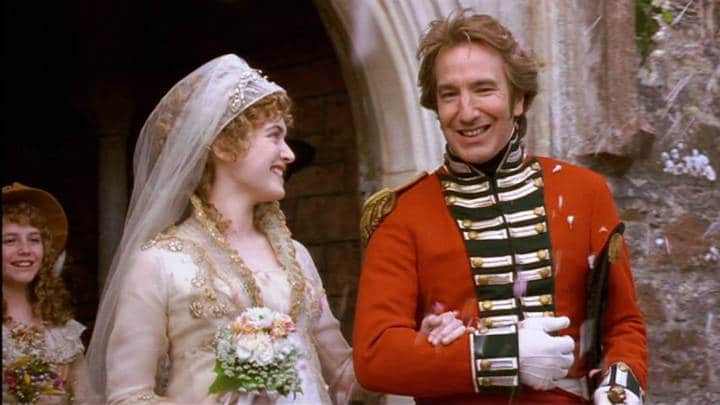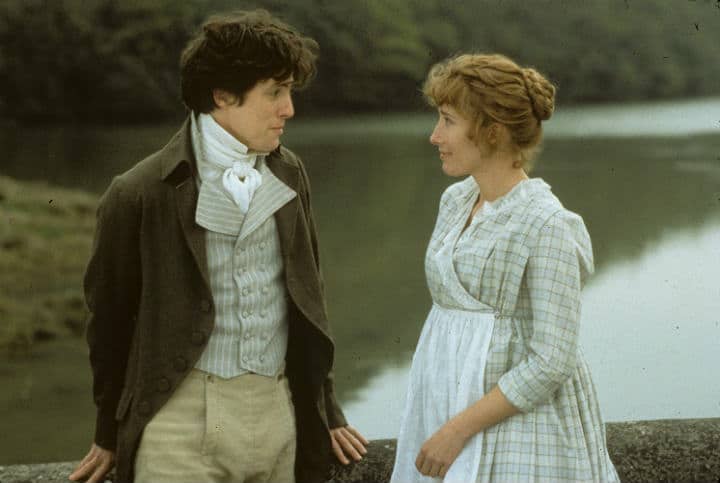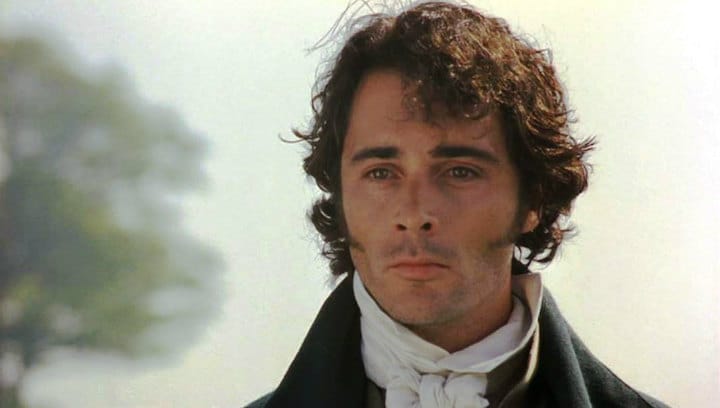Sense and Sensibility. If you’re a devoted Jane-ite, you’ve probably seen the 1995 adaptation of this beloved novel. However, If you’ve read the book, you may have noticed key differences between the two. There are specifically 3 major differences I want to focus on. They may be subtle, but they greatly impact the overall events in the storyline, giving you a new perspective on both the book and film.
1. Character Age Difference vs Character Casting

Many have noted that the filmmakers made the small decision to change the age of some characters. This wasn’t to their disadvantage either. It gave many great actors a chance to star in the movie, an opportunity they may otherwise have missed out on if the characters were younger.
Col. Brandon (played by the late Alan Rickman) is 35 in the novel but appears older in the film. The actor himself was 48 at the time and 13 years older than the character originally. Up until seeing the film, some fans of the book disliked the pairing between Marianne and Brandon, thinking him boring and too old.
Regardless, Alan Rickman’s charming performance of a devoted, love-struck man was immaculate. It won the hearts of many skeptics who once found Col. Brandon’s infatuation for Marianne to be strange.
RELATED: 25 TIMES PERIOD DRAMA ACTORS SMILED AND YOUR HEART MELTED!
Had they placed another actor in the role, audiences may not have had the same positive reaction. Alan Rickman clearly approached his character with his own style and interpretation of how he felt it should be portrayed.
Rickman gave a heartwarming and refreshing take on the character as a whole, and it goes to show how casting will either make or break a character’s popularity overall.
2. Charming Ferrars vs Emo Ferrars

In the novel of Sense and Sensibility, Edward comes to Barton cottage a lot sooner than we see him in the film. His company, however, is less than pleasant. He’s moody, silent, and short-tempered through the duration of his visit – very unlike the charming and awkward Edward of Hugh Grant’s portrayal.
This part of the book really changed my perspective of Edward. While reading, I found him difficult to sympathize with. Coming to Barton so soon in the novel meant he had every opportunity to tell Elinor about Lucy, and chose not to. He’s arguably portrayed as being very selfish and toys with both of the girls’ emotions.
However, he’s redeemed of these actions in the film. He’s otherwise disposed of for the majority of the movie, meaning he had little to no opportunity to confront Elinor.
RELATED: THE APPEAL OF OLD-FASHIONED ROMANCE & WHY ITS STILL IN STYLE
Omitting the scenes in the book where he first comes to Barton was necessary for the film adaptation. Otherwise, we might see Edward in a negative light when he’s really just a confused man in love and torment. He doesn’t want to damage the honor of his fiance by splitting with her but also wishes to be true to himself.
3. Willoughby the Villain vs Willoughby’s Redemption Arc

However, the most shocking difference is in Willoughby’s overall character arc. He’s painted as a very romantic man at first glance. But then we learn he’s very selfish when he abandons Marianne for a more profitable marriage. We also discover the shameful circumstances in which he left Col. Brandon’s ward. And by the end, we all despise him (though let’s be honest, we still swooned over him).
Despite this, in the novel, we come to a jaw-dropping reveal. When Marianne falls sick, we learn that the letter where Willoughby returned her lock of hair (and rejected her completely), wasn’t written by him. It was written by his fiance.
RELATED: TO REDEEM OR NOT TO REDEEM A RAKE: GUEST POST BY CHRISTINA BOYD
I literally screamed “What the heck!” after reading this portion of the novel. My opinion of him completely changed. In addition to him revealing this truth, he also came to see Marianne out of concern for her illness. There was no doubt he actually loved her.
He was still a selfish and greedy man in many ways, but it’s clear he was also a man in distress. He most likely felt forced into marriage with Miss Gray due to his disinheritance. The scene when he’s watching Marianne’s wedding from afar felt very different for me – showing his feelings of complete regret and longing for her.
RELATED: SENSE & SENSIBILITY (2008)- A GORGEOUS VERSION OF A JANE AUSTEN CLASSIC
Despite the differences between the novel and the film, both interpretations tell a fantastic story. In my personal case, I was much more captivated by the film. It brought to light many small things the novel didn’t touch on – such as Margaret being a tomboy, and Marianne’s passion for sonnet 116 (which is also my personal favorite). To this day, it’s one of my favorite movies.
Nevertheless, Sense and Sensibility itself is an underrated shining gem within classic literature. It will no doubt continue to hold its position as one of Jane Austen’s greatest novels.
What other differences did you spot between the film and novel of Sense and Sensibility? Do you prefer one over the other, or do you like them equally? Let us know in the comments below!
Photo Credit for the Featured image at the top: Columbia Pictures
ARE YOU A ROMANCE FAN? FOLLOW THE SILVER PETTICOAT REVIEW:
 Our romance-themed entertainment site is on a mission to help you find the best period dramas, romance movies, TV shows, and books. Other topics include Jane Austen, Classic Hollywood, TV Couples, Fairy Tales, Romantic Living, Romanticism, and more. We’re damsels not in distress fighting for the all-new optimistic Romantic Revolution. Join us and subscribe. For more information, see our About, Old-Fashioned Romance 101, Modern Romanticism 101, and Romantic Living 101.
Our romance-themed entertainment site is on a mission to help you find the best period dramas, romance movies, TV shows, and books. Other topics include Jane Austen, Classic Hollywood, TV Couples, Fairy Tales, Romantic Living, Romanticism, and more. We’re damsels not in distress fighting for the all-new optimistic Romantic Revolution. Join us and subscribe. For more information, see our About, Old-Fashioned Romance 101, Modern Romanticism 101, and Romantic Living 101.

What an interesting comparison. Since I haven’t read the book, I didn’t realize there were any significant differences. Have you seen the 2008 mini-series? I love that one too!
I haven’t been able to get a hold of that version! I’ve been dying to see it, I love Dan Stevens and he seems like a perfect Edward.
The completely missing scene where Willoughby arrives in the middle of the night to try to see Marianne when she is ill. One of the most dramatic moments in the novel, missing from the film. It was included in the BBC’S VERSIONS.